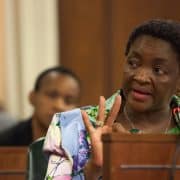|
Getting your Trinity Audio player ready...
|
Corruption Watch emerged victorious on Friday when the South Gauteng High Court ruled in favour of the organisation, setting aside a payment of R316-million by the South African Social Services Agency (Sassa) to social grant distributor Cash Paymaster Services (CPS). CPS was also ordered to pay back the full amount, with interest, to the state. The interest would have to be backdated to the time of the transaction, May 2014.
Corruption Watch approached the North Gauteng High Court in March 2015, citing irregular expenditure incurred for the re-registration of beneficiaries. The organisation’s argument was that the re-registration process was already catered for in the original contract between Sassa and CPS, a renewal of which was entered into in 2015. It thus did not make sense for an extra payment to be made to CPS.
Sassa contested the legal action when it was instituted, but later made an about-turn early last year, withdrawing its opposition to the review application after two years of defending its position. This left CPS – the only other respondent in the matter – on its own. Then Sassa CEO Thokozani Magwaza conceded to the Standing Committee on Public Accounts (Scopa) at the time that the transaction, entered into by his predecessor Virginia Pietersen and CPS, was “a thorn in their lives”.
He further gave assurance that Sassa would abide by whatever decision the court makes. Magwaza resigned from Sassa just two months later, in July, citing lack of support from then minister Bathabile Dlamini, who was moved to the department of women within the Presidency, and replaced with Susan Shabangu in February this year, two weeks after President Cyril Ramaphosa was inaugurated.
Defending the indefensible
At the time of its withdrawal from the case, Corruption Watch wrote to Sassa requesting reasons for the reversal. In a letter from the agency’s legal representatives, Sassa told Corruption Watch that the decision to withdraw was taken, after much consideration, since the officials who initiated the payment were no longer working for Sassa.
Another reason was that Corruption Watch’s arguments in court had cast “a different light on the matter, in particular the information published by Net1 in its financial statements for purposes of regulatory authority in the US did not accord with provisions of the service level agreement relied upon by Sassa in its initial view in opposing the application.” Net1 is the parent company of CPS, and is listed on the Nasdaq as well as the Johannesburg Securities Exchange.
“Legal counsel told us that it may not be prudent for you to carry on defending on this issue because there are things that are glaring that are written on to the contract,” Magwaza later told Scopa. “There is a legal opinion or advice that says it would be irrational for us to defend on something that in our own books is written in such a way that maybe we were not supposed to have done it.”
Condoned, then not condoned
Prior to the court process, however, Sassa had asked National Treasury for a condonation of the expenditure. Although Treasury had agreed to the condonation, it later retracted this, in light of the court action.
When approached by Corruption Watch following the judgment, Treasury said it “welcomes the decision of the court, it strengthens the efforts to fight irregularities in public procurement.”
Asked whether it had thoroughly checked the merits of the condonation request from Sassa prior to taking the decision to grant it, the response was: “National Treasury did not conduct forensic investigation on the matter, but was later alerted that Sassa misrepresented facts when applying for the condonation of irregular expenditure, which lead to the withdrawal of the condonation.”
Judge Moroa Tsoka, in delivering the judgment, said: “As a result of Sassa’s unlawful conduct, the fiscus has been robbed of a substantial amount of money intended for the most vulnerable and poor people of our country.
“It is just and equitable that the payment of R316-million made by Sassa to CPS, together with interests, be returned to the fiscus for the benefit of those for whom it was intended in the first place.”








